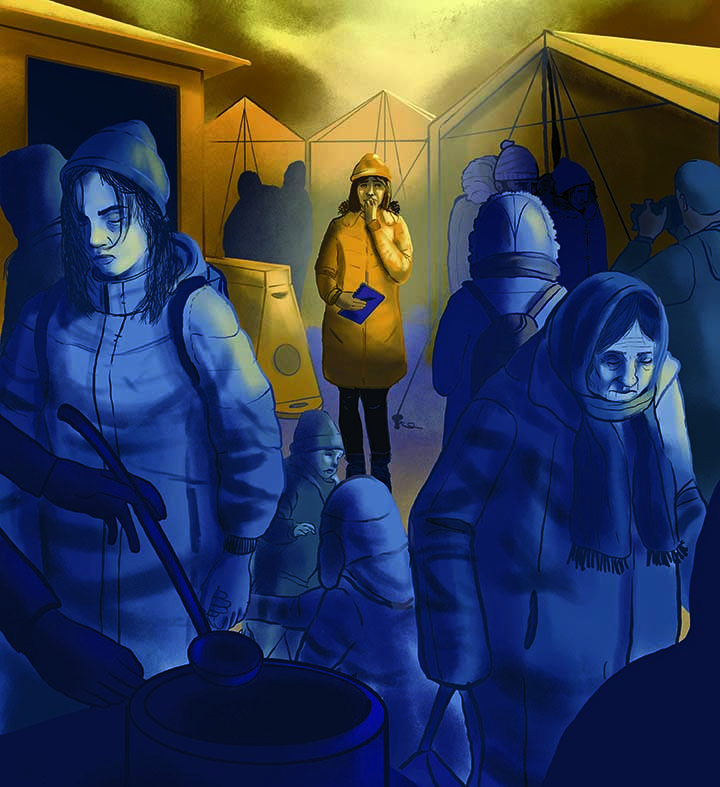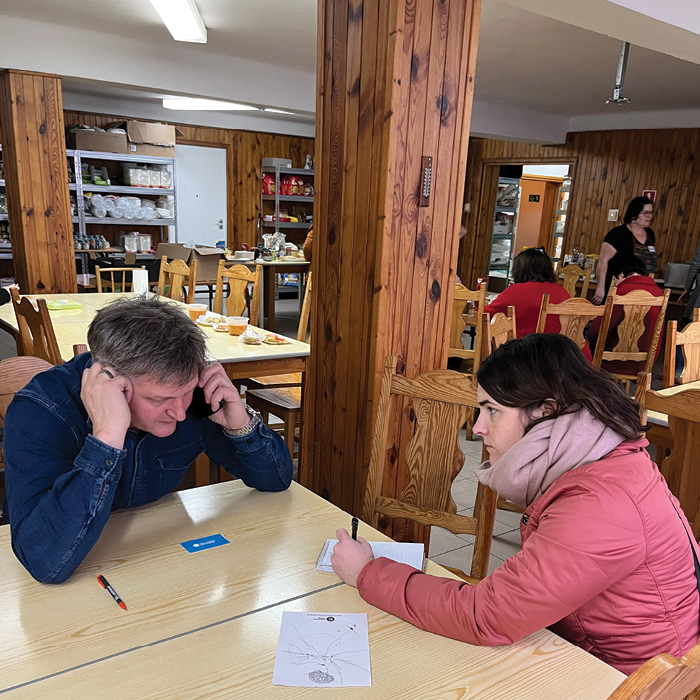
Alumna Katelyn Ferral reflects on her difficult but necessary journalistic duty to tell the stories of Ukraine’s refugees.
It was day four of reporting at refugee checkpoints along the Ukraine-Poland border when the look on one woman’s face stopped me.
She was waiting in line to enter a vacant grocery store turned refugee shelter. With the weather overcast and cold, she and dozens of others stood in small groups in the store’s parking lot, holding suitcases and stuffed grocery bags. Volunteers quickly spooned soup into bowls at stands outside and folded sweaters and blankets on tables for the taking.
Police and volunteers minded the entrance as I approached. No media allowed.
I was on assignment with USA Today, covering the humanitarian crisis invoked by the Russia-Ukraine war and had interviewed many who had just left their lives and family members behind. It was my job to talk to people, get a glimpse of who they are and what they are experiencing — a lot of ground to cover in a short conversation through a translator. Then I had to distill those conversations into compelling stories for readers in the U.S.
I gently approached people in and outside of train stations, grocery stores, border checkpoints and food stands and while they were sitting on parked buses awaiting processing after entering Poland.
Today, I scanned the crowd in front of the store and again glanced at the woman waiting in line. She stared ahead with a blank look, two grocery bags at her feet and three children running in circles around her. She looked exhausted, as if she was living the worst day of her life, as if she could burst into tears at any moment if she wasn’t too tired to do so.
One part of me felt like I still needed to approach her. I was sent here on an expensive international reporting trip to talk to as many people as possible, to share details and distinct dimensions of what was happening. I needed to produce.
The other part of me could not do it.

I milled about with my notebook out, my fingers getting numb, my eyes surveying this group and that group. Other reporters from all over the world hovered around groups of refugees as they disembarked from buses — some with long-lens cameras, others with film crews — practicing their scripts and interviewing Ukrainian families on camera. More and more buses drove in, unloading more women and children.
I headed back to the car with my interpreter, Hubert, a 21-year-old Polish bodybuilder who makes money teaching people on YouTube how to invest in cryptocurrency.
I teared up and tried to hide it, but the tears kept coming. I was tired, sad at the world and mad at myself. I was too sensitive. Full-time foreign correspondents probably never cry.
“I’m sorry. I don’t know why I’m crying,” I said to Hubert.
“It is OK,” he said in his thick Polish accent. “Sometimes we need a time to cry.”
Asking questions is a fundamental part of being a journalist. I’d done it many times before in tough circumstances. But throughout my career I’ve learned to listen to my gut. If our aim as journalists is to open a window into another human’s experience, an important part of doing that well is being mindful of the process by which you are capturing their story.
Most Ukrainians I approached were exceedingly gracious and patient in sharing their stories. Those I encountered on the border are now refugees, but they remain dentists, engineers, nail technicians and store managers. Their new reality does not eclipse their whole life. They are refugees not because of who they are but because of what they are experiencing.
More than 1.4 million Ukrainians have fled the war into Poland with nearly 7.6 million people leaving their home country in all since February 24, according to the United Nations. When millions of people are going through the same experience, it becomes easy to rely on labels and focus on numbers in one’s writing, especially when the numbers are so large. But that doesn’t help readers understand the experience or the person enduring it.
As the war in Ukraine continues and tragedies continue to occur there and in our own country, it can be hard to believe that one small story can do much good.
I must keep choosing to believe it can.



